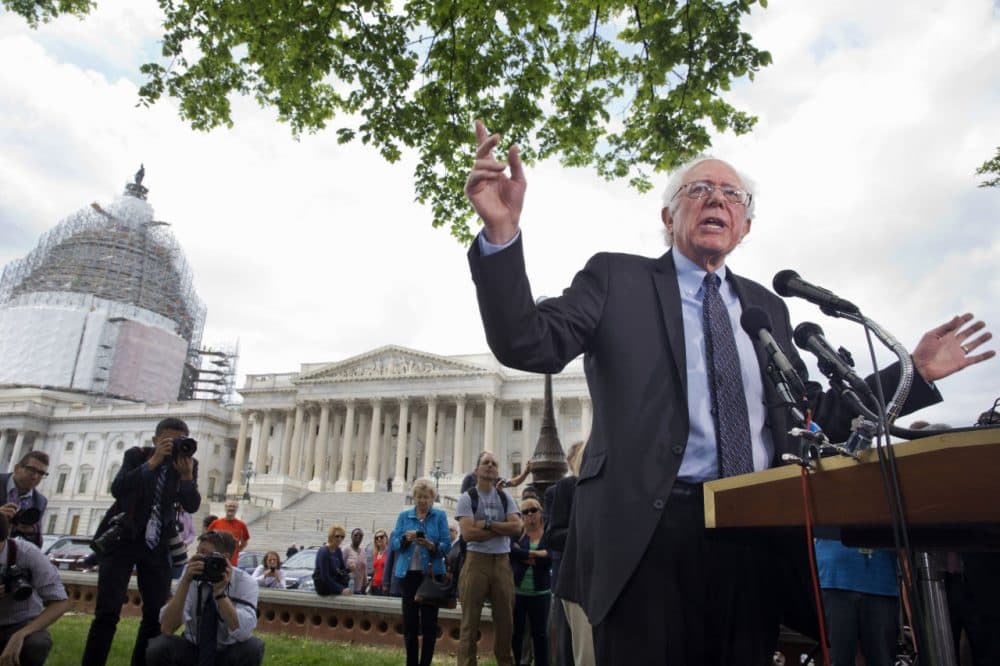Advertisement
Commentary: Can Bernie Sanders Beat Expectations?

If you didn’t see Bernie Sanders’ short press conference announcing his candidacy for president as a Democrat, you might want to check out the video. It was a refreshing change from all the staged campaign announcements. There was no hoopla or unveiling of a slogan.
The 73-year-old Vermont senator may seem eccentric, but as a self-described “democratic socialist” he’s a true believer. And he says he is “running to win,” despite the odds.
Starting out, he is being treated as either a joke or Don Quixote.
Jimmy Fallon, host of “The Tonight Show,” showed a picture of him with unruly white hair, supposedly confusing him with a picture of Doc from “Back to the Future.”
Jon Stewart, the retiring host of Comedy Central’s “The Daily Show,” offered a wry comparison of Sanders with Hillary Clinton: "She has almost 100 percent name recognition; he is somewhat lesser known. She has a private server in her home where she deleted tens of thousands of her own e-mails. He owns a VHS copy of 'Tootsie.' He has a set of consistent principles that he has run on his entire political life. She is going to crush him."
A few months ago, the idea that Sanders could be anything more than a nuisance to Clinton would have seemed preposterous. Her lead over potential Democratic rivals — including Vice President Joe Biden — was staggering. Her lead today is still impressive. According to the latest Real Clear Politics average of national polls, she has 62 percent support from Democratic voters. Sanders had only 5.6 percent — but that was much better than three other would-be Democratic candidates: former Maryland Gov. (and former Baltimore Mayor) Martin O’Malley, former Virginia Sen. Jim Webb, and former Rhode Island Gov. and Sen. Lincoln Chafee.
But while Clinton was once thought to be inevitable, she has dramatically declined in polls on questions like whether she’s honest and trustworthy. Two scandals have had some Democrats wondering whether the party should put all its eggs in her basket this early:
- Using a secret email account while secretary of state, then suspiciously deleting 30,000 emails and destroying the server.
- Foreign money pouring into the Clinton Foundation, and her husband’s pockets in the form of exorbitant speaking fees, while many of those foreign governments, corporations and individuals sought contracts or influence with her as secretary of state.
Advertisement
The issue of foreign money, and “dark money” in campaigns, having a corrupting influence is one of the major issues raised by Sanders in explaining his rationale for running. And he said it is not just a problem for Clinton -- but for both parties. This case was made by journalist Ezra Klein in a commentary titled, “The bipartisan corruption of American politics.”
Still, revelations about the Clintons have made her inevitability seem less certain. Ron Fournier, writing in the National Journal, explained why the new stories are so serious in his commentary, “The Proof of the Clintons Wrongdoing.” And in a tweet he asked, “Why hasn’t @BarackObama publicly rebuked @HillaryClinton for repeatedly violating his ethics rules?”
Sanders, who might be thinking of himself as a David taking on Goliath, at least doesn’t have to worry about explaining involvement in any scandals. That gives him more “freedom of speech” when it comes time to debate his opponent on issues like campaign finance reform.
In the meantime, however, Washington Democrats have continued to defend Clinton on the “coincidences” of the foreign money scandal. Liberal journalist David Sirota, a writer for the International Business Times, is aghast at their hypocrisy — or at least surprised by the flexibility of their principles. He wrote:
Less than three weeks into her presidential campaign, Hillary Clinton has already accomplished a stunning feat: She appears to have unified large swaths of the Democratic Party and its activist base to support the core tenets of the Supreme Court's ‘Citizens United’ decision — the one that effectively allowed unlimited money into politics.
That 2010 high-court ruling declared that unless there is an explicit quid pro quo, the fact that major campaign donors ‘may have influence over or access to elected officials does not mean that these officials are corrupt.’ The theory is that as long as a donor and a politician do not agree to an overt bribe, everything is A-OK.
When the ruling was handed down, Democrats were outraged, and Hillary Clinton herself recently suggested she wants it overturned. Yet with revelations that firms with business before Clinton's State Department donated to her family's foundation and paid her husband, former President Bill Clinton, Hillary Clinton's campaign and rank-and-file Democratic activists are suddenly championing the Citizens United theory.
In campaign statements and talking points — and in activists' tweets and Facebook comments — the party seems to be collectively saying that without evidence of any explicit quid pro quo, all the Clinton cash is acceptable. Moreover, the insinuation seems to be that the revelations aren't even newsworthy because, in the words of Clinton campaign chairman John Podesta, ‘there’s nothing new’ here.
To advocates for limiting the influence of money in politics, this pushback from Democrats is particularly rich (pun intended) coming from a party that spent a decade asserting that Republicans raking in cash from Big Oil and pushing oil-friendly policies was rank corruption. The Democratic defense of their presumptive presidential nominee registers as especially disturbing to campaign finance reform advocates considering the mighty efficiency of the Clinton fundraising machine.
In his announcement of his candidacy, Sanders said the issue of money’s corrupting influence is directly related to his main issue of income inequality. He believes that “the billionaire class” has rigged the system so that the rich get richer and the poor get poorer, and the middle class gets squeezed. It is the same thesis that Sen. Elizabeth Warren has championed.
Will supporters of Warren back Sanders’ bid, or at least view his candidacy as a constructive way to push Clinton to be more of a liberal populist?
Clinton has shown her willingness to change her fundamental beliefs by flip-flopping from her earlier support of mass incarceration policies — policies promoted and implemented by President Bill Clinton. The Washington Post reported on how she now is, in effect, “running against parts of her husband’s legacy.” She is also considering whether to go against another part of her husband’s legacy — support of free trade. Sanders says he’ll make a big issue out of his opposition to Obama’s proposed TPP agreement. Clinton is still ducking questions about it.
Sanders, though, has to cope with a different legacy — the failure of past socialist candidates, and the perception that socialism is a threat to economic freedom and growth. The Washington Post reported that “52 percent of Democrats are OK with” Sander’s avowed socialism.
Some of their open-mindedness about socialism might be due to war-weariness. Despite Obama’s promise to wind down our military commitments, the U.S. is now involved in five wars, and has special forces in 81 nations. Sanders stressed in his announcement that Clinton made a mistake in voting to authorize force in Iraq. Like Obama in his 2008 competition with Clinton, Sanders will criticize Clinton’s hawkish positions.
But Clinton campaign operatives must feel some relief that Sanders promised not to run “vicious personal attack ads,” which he says he has never run in his many years in public office.
Sanders hired a veteran Democratic strategist to help organize his campaign — or, as he put it, “try to put together a movement.” Tad Devine worked as a campaign aide to John Kerry, Al Gore and Michael Dukakis. Maybe he can do for Sanders what Joe Trippi did for another Vermonter, former Gov. Howard Dean, when he ran for president in 2004 and caught fire (but then made some mistakes — “yeehaw!” — and ended up losing to then-Sen. Kerry).
In his announcement remarks, Sanders made a plea to the news media. He urged reporters to focus on the big issues, not the “gossip and soap opera aspects." The man is 73 years old, yet he can still sound like an innocent idealist. That may seem disqualifying to Washington insiders, but maybe their perception is skewed as it was with past presidential contenders they didn’t take seriously before Iowa, like George McGovern and Jimmy Carter. We’ll see if Sanders can be as surprising and beat media expectations. Regardless, he’ll make this campaign more interesting.
Todd Domke is a Republican analyst for WBUR.
